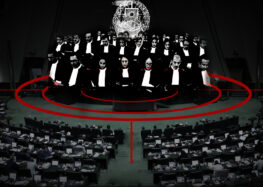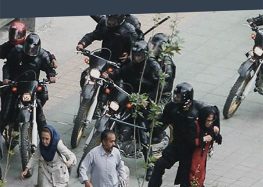Rouhani Government and Conservatives Clash over Laws on Female Dress

More than two-thirds of the members of the Iranian Parliament—216 MPs—have signed a resolution supporting the implementation of a law that requires women to observe strict rules on clothing in public.
The Rouhani administration has expressed doubts on the effectiveness of coercive tactics against women who are not as observant as hardliners in the Islamic Republic would like them to be. The Parliamentary resolution reflects an intensifying debate in Iran on laws regarding female attire, or hijab.
Since passage of the Preservation of Chastity and Hijab Plan by the Supreme Cultural Revolution Council on January 3, 2015, there has been renewed public debate both within government circles and among the public at large regarding the efficacy and applicability of strict, legislated dress codes. Apart from any debate regarding the codes themselves, many question whether such restrictions are able to be implemented in practice.
“It is impossible to force and coerce people into being chaste and wear the hijab,” President Rouhani said in a speech to women’s affairs officials on July 12.
That view has been echoed by other government officials as well. According to Vice President Shahindokht Molaverdi, Rouhani’s adviser on women and rsmily affairs, the Islamic Republic has not been successful in carrying out hijab rules. “Society’s realities tell us that we have not done a good job. We have distanced ourselves from the goals of the law on spreading hijab and chastity,” she said.
There are 24 organizations in charge of controlling and carrying out hijab rules “but their duties aren’t in harmony with existing realities,” Molaverdi added.
The hardline Judiciary in Iran has pushed back: Judiciary Spokesman Gholamhossein Mohseni Ejei reminded people that “not wearing the hijab is a crime and it will be dealt with.” Yet critics say there is a large grey area regarding “proper” hijab, as well as disparate views regarding how “improper” hijab should be addressed.
The Friday Prayer leader of Mashhad, Ahmad Alamolhoda, noted the difficulties involved in forcing women to wear strict hijab (and the similarities to the difficulties faced by the monarchy in Iran before the 1979 Islamic Revolution when force was used to rid society of the hijab), but he asserted nonetheless that “We must stop bad hijab practices. Those who reject the hijab are rejecting the Quran and those who reject the Quran are infidels.”
Conservatives have good reason to be concerned about the status of the hijab. Official statistics show that interest in religious rules on women’s attire has dropped drastically despite 36 years of Islamic rule.
Mohammad Aghassi, the head of the Iranian Students Polling Center told Fars New Agency on May 28 that only 25 percent of Iranians are inclined towards the hijab. He also described the 10 percent drop in interest in the chador black cloak between 2006 and 2014 as a “disaster.”
For much of the past year, the Rouhani administration and Parliament have also fought over the Plan to Promote Virtue and Prevent Vice, a bill that explicitly calls upon the Basij militia (an all-volunteer paramilitary force that is an arm of Iran’s Revolutionary Guards) to enforce ultraconservative notions of proper hijab on all Iranian women. In practical terms, it is another tool hardliners have used use to stop the tide against lax obedience of hijab rules.
The bill was passed by Parliament and became law on April 22 despite the Rouhani administration’s opposition. It has been linked to a series of acid attacks against women (who were “improperly” attired) in Isfahan in late 2014 when the bill was still pending and leading clerics made statements for stronger action against women with “poor hijab.”
President Rouhani has been reluctant to actively implement the Promote Virtue law in spheres under his control such as the police force and government ministries. In a letter to Supreme Leader Khamenei, Rouhani asked for the law to be suspended “until its weaknesses are removed.” Rouhani’s letter has been widely criticized by hardliners and Khamenei has not yet given his reply.






